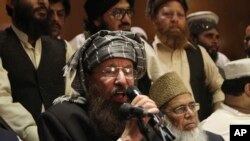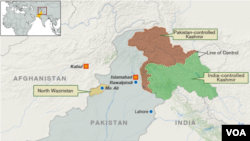ISLAMABAD —
Pakistan’s attempts at peace talks with Taliban militants appeared on the edge of collapse Thursday.
Interior Minister Choudhry Nisar Ali Khan said the civilian government and the nation’s powerful military have agreed: negotiations with the militants cannot proceed in the face of repeated terrorist attacks.
Khan said Pakistan’s security forces have the right to defend themselves, and what was witnessed in the past 24 hours is a reflection of that.
The statement followed military strikes early Thursday against militant targets in the tribal area of North Waziristan which killed at least 35 militants.
The strikes were in retaliation to attacks against Pakistani security forces, including the execution of 23 soldiers who were held hostage by militants in neighboring Afghanistan.
Pakistan conveyed a strong protest to the Afghan government that the killing took place on their soil.
According to analyst Anatol Lieven of King’s College Department of War Studies in London, there appears to be a strong will in the Pakistani military to launch offensives against the Taliban in North Wazirisitan, an area they have shied away from in the past.
“The high command of the military has, I think, genuinely come to recognize in recent years the extent of the Pakistani Taliban threat,” he said, adding that the civilian government appeared less convinced.
Prime Minister Nawaz Sharif previously said that dialogue with the Tehreek-e-Taliban would be a cornerstone of his administration. But talks broke down earlier this week.
The Tehreek-e-Taliban, a loose network of Islamist militants, now operates across large areas of the country, including the main Punjab province, and the southern port city of Karachi.
Lieven said that could prove to be a major challenge.
“I suspect that we will see intensified action in the tribal areas, coupled with increased terrorism elsewhere in the country,” he said.
Khan announced Thursday that the government is beefing up its security systems in and around the capital, Islamabad. But he dismissed a report that there were terrorist “sleeper cells” in the city.
Despite the military action, he said the government is still ready to sit down with the Taliban to seek a political end to the violence.
Analysts agree there appear to be increasing divisions within the Taliban, between those who want a settlement with the government and others who are determined to continue fighting.
But some analysts say peace talks are not likely to succeed because the demands of the Pakistani Taliban are so extreme that if the government were to accede to them, it would in effect mean the end of the Pakistani state.
Interior Minister Choudhry Nisar Ali Khan said the civilian government and the nation’s powerful military have agreed: negotiations with the militants cannot proceed in the face of repeated terrorist attacks.
Khan said Pakistan’s security forces have the right to defend themselves, and what was witnessed in the past 24 hours is a reflection of that.
The statement followed military strikes early Thursday against militant targets in the tribal area of North Waziristan which killed at least 35 militants.
The strikes were in retaliation to attacks against Pakistani security forces, including the execution of 23 soldiers who were held hostage by militants in neighboring Afghanistan.
Pakistan conveyed a strong protest to the Afghan government that the killing took place on their soil.
According to analyst Anatol Lieven of King’s College Department of War Studies in London, there appears to be a strong will in the Pakistani military to launch offensives against the Taliban in North Wazirisitan, an area they have shied away from in the past.
“The high command of the military has, I think, genuinely come to recognize in recent years the extent of the Pakistani Taliban threat,” he said, adding that the civilian government appeared less convinced.
Prime Minister Nawaz Sharif previously said that dialogue with the Tehreek-e-Taliban would be a cornerstone of his administration. But talks broke down earlier this week.
The Tehreek-e-Taliban, a loose network of Islamist militants, now operates across large areas of the country, including the main Punjab province, and the southern port city of Karachi.
Lieven said that could prove to be a major challenge.
“I suspect that we will see intensified action in the tribal areas, coupled with increased terrorism elsewhere in the country,” he said.
Khan announced Thursday that the government is beefing up its security systems in and around the capital, Islamabad. But he dismissed a report that there were terrorist “sleeper cells” in the city.
Despite the military action, he said the government is still ready to sit down with the Taliban to seek a political end to the violence.
Analysts agree there appear to be increasing divisions within the Taliban, between those who want a settlement with the government and others who are determined to continue fighting.
But some analysts say peace talks are not likely to succeed because the demands of the Pakistani Taliban are so extreme that if the government were to accede to them, it would in effect mean the end of the Pakistani state.






